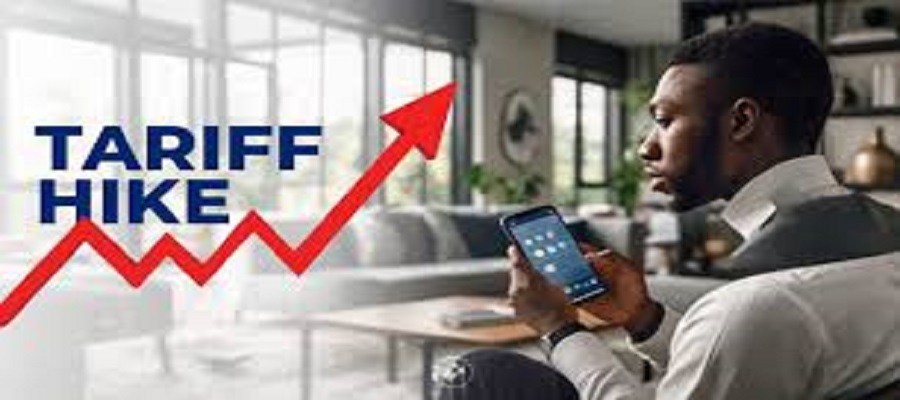Telecom
Telcos Record 9,077 Service Outages in Q2 2020, Says NCC

The Nigerian Communications Commission (NCC) has said that major mobile network operators (MNOs) in the country recorded 9,077 cases of service outages on their networks in the second quarter of the year, resulting in unexpected disruptions to operators’ network quality of service (QoS) delivery and intermittent quality of experience (QoE) by the consumers.
Mr. Adeleke Adewolu, executive commissioner, Stakeholder Management (ECSM), NCC, disclosed this in a presentation delivered during the first Virtual Telecoms Consumer Parliament (VTCP) hosted by the Commission recently in Abuja.
According to Adewolu, of the 9,077 service outages recorded by the operators, 3,585 were caused by incidences of denial of access to telecoms sites for maintenance, 4,972 were triggered by incidences of fibre cuts from construction activities and vandalism while 520 cases were as a result of incidences of generator and battery theft at sites.
Adewolu, however, noted that in a proactive step to mitigate the challenges, the Commission had swiftly responded by taking some major decisions to mitigate any unforeseen challenges that may cause serious disruptions in service delivery to the consumers throughout the period of the COVID-19 pandemic.
He said, “the Commission approved resource sharing by operators throughout the period of COVID-19 pandemic.” These include fibre optic cables and other resources in the event of cable cuts and other unforeseen developments.
“We also ensured that the service providers meet the needs of their teeming consumers by securing Right of Passage (RoP) for all telecommunications officials and staff for easy movement during the lockdown.
“This was to ensure ease of movement to service base stations and other telecom facilities and equipment,” among others.
The ECSM called on all stakeholders to join hands with the Commission in enlightening all citizens on the need to protect the telecom infrastructure in their domain without which quality of service delivery will be hampered.
He noted that the numerous complaints received from consumers by the Commission since the outbreak of the pandemic were indicative of the widening gap between the consumer QoS and the QoE provided by the service providers, which, according to him, needed to be addressed.
He charged operators on the need to increase and improve their network capacity following the unprecedented increase in consumer demand.
“Also, service providers must embark on pervasive consumer education and enlightenment campaign about data usage and billing to ensure their subscribers have all the required information to make informed decisions so as get value for money spent.
“Operators also need to train and equip their customer care personnel on consumer complaint management as well as ensuring that consumer complaints are resolved conclusively and in line with the revised Service Level Agreement (SLA),” Adewolu said.
He warned service providers to refrain from indulging in unwholesome practices such as modification of data plan without informing the consumers, putting out promotional advertorials without prior approval by the Commission, changing the names and nomenclature of promotions from what was approved, among others to short-change the consumers, warning that the Commission will not hesitate to sanction erring operators.
The ECSM noted that the Consumer Code of Practice requires that once a contract agreement is signed, both parties should adhere to the contract terms and conditions and where a change is required, the validity period should end before any modification is effected.
Telecom
Telecom Tariffs Set to Rise by 50 Percent as NCC Approves Adjustments

Nigerian Communications Commission (NCC) has announced that it will approve tariff adjustment requests by network operators, in response to current market conditions.

The adjustments, capped at a maximum of 50% of current tariffs, are lower than the over 100% requested by some operators.
These changes will remain within the tariff bands stipulated in the 2013 NCC Cost Study and will be reviewed on a case-by-case basis, adhering to the NCC Guidance on Tariff Simplification, 2024.
The adjustments aim to address the gap between operational costs and current tariffs, ensuring service delivery is not compromised.
They will support operators in investing in infrastructure and innovation, benefiting consumers through improved services and connectivity.
The decision was made after extensive consultations with stakeholders, balancing consumer protection and industry sustainability.
The NCC has mandated transparent implementation and public education on the new rates, with a focus on measurable service improvements.
The NCC remains dedicated to fostering a resilient, innovative, and inclusive telecommunications sector, supporting indigenous vendors and suppliers, and promoting Nigeria’s digital economy.
The Commission will continue to engage with stakeholders to create a telecommunications environment that works for everyone.
Telecom
Subscribers Reject Tariff Hike, Say FG Cannot Speak for Them

Telecommunication subscribers under the aegis of Association of Telephone, Cable TV and Internet Subscribers of Nigeria (ATCIS-Nigeria), at the weekend rejected the 30-60 per cent tariff increase proposed by Bosun Tijani, minister of Communications, Innovation and Digital Economy, insisting that there should be no increase for now.

ATCIS-Nigeria said Tijani cannot speak for them, saying there is no conclusion on the tariff increase yet.
Sina Bilesanmi, national president, ATCIS-Nigeria in a statement, said a tariff hike was not one of the issues agreed upon with the regulator in Abuja, wondering why the minister is interested in hiking tariffs to the detriment of struggling Nigerians still reeling under the impact of economic reforms.
He said the minister’s statement was contrary to the agreements reached between the Consumer Bureau Department of the Commission of the Nigerian Communications Commission (NCC) and stakeholders at a meeting convened on January 9, 2025, at the NCC headquarters in Abuja.
According to him, what was agreed upon at the January 9 Abuja meeting was that there would be no telecoms tariff hike for now until all the stakeholders, particularly the subscribers, are sufficiently enlightened and sensitised.
Recall that the minister, in a TV interview, had said even though the mobile network operators (MNOs) were demanding a 100 per cent increase to stabilise the sector, the government knew that such a level of increase would be harmful to the people.
On the threshold of the expected hike, he said: “I think it should not be more than anywhere between 30 to 60 per cent. We have already made it clear that we are not going to approve 100 per cent. These companies are asking for 100 per cent, stating clearly that this is what they believe they need to get.
“But what we are looking at in terms of the sector is that if this is the sector that is responsible for driving growth in our country, it will be harmful to our people to allow MNOs to increase by 100 per cent.”
However, Bilesanmi said it was not the duty of the minister to speak for tariff pricing, insisting that it is the responsibility of the NCC which has already started doing the consultation to do data-based empirical cost analysis.
He said the minister has no power to fix prices in a liberalised market.
“Our resolution was, one, that the telecom operators need to respect the telecom subscriber advocacy body and the act of NCC; that the NCC should tell the telcos to first meet with ATCIS being the telecom subscriber advocacy body for consultation, involvement, enlightenment, and engagement; that once telecom subscriber advocacy body agreed, it will call for public opinions on the per cent rate, and that ATCIS will then write NCC for approval, and anything outside of these may not work.
“As subscribers, we should be in collaboration with NCC because we’re the ones paying the money involved. We agreed at the meeting that there will be no hike but further deliberation and consultation on the issue with relevant stakeholders, especially the MNOs and the subscribers would continue.
“The MNOs, through their representatives (ATCON and ALTON), were supposed to organise an enlightenment/sensitisation programme to address the issues. The MNOs were supposed to discuss the percentage increment with the subscribers’ representatives after which it will be taken to the subscribers for discussion. At the end of the meetings, we were expected to communicate an equilibrium price (a fair price agreeable to all) to the NCC for final approval,” he said.
According to Bilesanmi, any tariff hike will do more harm than good to the subscribers at a time when they are struggling to cope.
“It will further impoverish our members, especially small business owners whose offices and shops are their mobile phones and laptops. A hike in voice and data prices without recourse to the subscribers will spell doom for their business,” he said, adding that it might slow down the gains of the government’s digital economy ambition.
“ATCIS is the leading telecom subscriber advocacy body in Nigeria with over 220 million members across 36 states in the six geo-political zones in Nigeria.
“It has a mission to promote mutual co-existence, and fair play, and defend the rights of telecom subscribers, by endorsing and ensuring good products and network service delivery from network operators and service providers to our corporate and individual members, while providing a platform to advance the rights of Telephone, Cable Tv and Internet Subscribers.”
Telecom
MTNN Raises N42.20Bn through Commercial Paper

MTN Nigeria Communications (MTNN) Plc has raised the sum of N42.20 billion through the commercial paper (CP) issuance.

Karl Toriola, chief executive officer, MTN Nigeria
The company in a statement signed by Uto Ukpanah, its secretary, notified Nigerian Exchange Limited and the investing public of the successful completion of its Series 15 and 16 Commercial Paper issuance under the Company’s N250 billion Commercial Paper Issuance Programme where the Company raised N42.20 billion.
It added that “the 180-day and 270-day CP were issued at yields of 27.50 per cent and 29.00 per cent, respectively, with an issue date of December 23, 2024.
This follows the successful completion of two prior CP issuances in the last two months.”
MTNN stated that the proceeds will be applied towards the Company’s short-term working capital requirements.
Karl Toriola, chief executive officer, MTN Nigeria, said, “we are grateful for the success of this transaction which underscores investor confidence in MTN Nigeria’s business model and management team.
“The CP Issuance is part of our established funding strategy and would not have been possible without the unwavering support of the investor community, as well as our advisers.”
MTN Nigeria has been actively raising funds through its N250 billion Commercial Paper Issuance Programme, a strategic initiative designed to support its operational and business goals.
The recent Series 15 and 16 issuances achieved an 84.4 per cent subscription, reflecting ongoing investor interest. On November 29, 2024, the company successfully launched Series 13 and 14 Commercial Papers, offering yields of 27.50 per cent for the 181-day tenor and 29.00 per cent for the 270-day tenor.
Initially aimed at N50 billion, these issuances saw overwhelming demand, resulting in an oversubscription of 144 per cent and ultimately raising N72.18 billion.

 News2 days ago
News2 days agoSERAP Petitions Trump, Urges Recovery of Stolen Nigerian Assets, Barring Corrupt Officials from US

 News2 days ago
News2 days agoNigeria’s Electricity Exports Hit $112m amid Persistent Power Outage

 Telecom2 days ago
Telecom2 days agoSubscribers Reject Tariff Hike, Say FG Cannot Speak for Them

 E-Financial2 days ago
E-Financial2 days agoOver 562m People Own Cryptocurrency Globally

 Telecom2 days ago
Telecom2 days agoMTNN Raises N42.20Bn through Commercial Paper

 General News2 days ago
General News2 days agoNIS Announces Maintenance on Passport Portal

 General News2 days ago
General News2 days agoNITDA, NFIU Collaborate on AML/CFT Data Management System Upgrade

 E-Financial2 days ago
E-Financial2 days agoSEC Sets January 31 Deadline for CMOs Registration Renewals



















